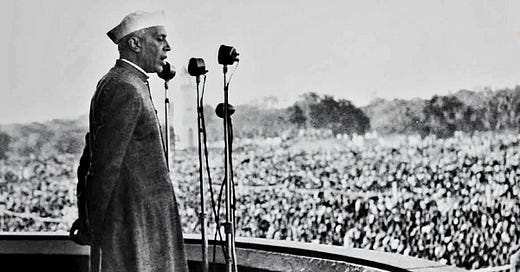It is an undeniable fact that modern India could not have been constructed without the exemplary vision of Pandit Jawaharlal Nehru. To transform a motley collection of hundreds of princely states into a liberal, secular democracy capable of sustaining itself was no easy task. In popular discourse, Nehru is often portrayed as a champion of democracy and human rights – the man the world looked up to. His opposition to communal organisations like the Muslim League and Hindu Mahasabha is widely praised by one section of society, while often drawing criticism from another. He remains a polarising figure, one whose relevance continues to loom large over Indian politics. His policies are routinely unearthed in contemporary political debates, casting a long shadow not just over India, but also South Asia and the Global South more broadly. Yet, buried in the annals of history lies a story few speak of today.
On the 16th of May 1951, barely a year after the Constituent Assembly had framed the Constitution of India, Nehru moved the First Amendment Bill to be referred to a standing committee in Parliament. He declared that the Constitution had been hijacked by lawyers, and claimed that fundamental rights and civil liberties were relics of the past – no longer suited to the needs of a dynamic 20th-century society. Nehru was furious. The very ideas he had long nurtured and projected to the world were being struck down by the courts. Perhaps the most significant blow to Nehru’s grand socialist agenda was the judiciary’s declaration that land reform laws were unconstitutional. At its core, the First Amendment sought to curtail three Fundamental Rights: freedom of speech, the right to property, and freedom from discrimination. While the curbing of these rights was itself troubling, what made it even more concerning was that such a sweeping amendment was presented before an indirectly elected provisional parliament, before India’s first General Elections had even been held.
From the outset, there had been broad consensus among the framers that the Constitution must be a charter of freedom. Rajendra Prasad declared that their goal was to place "before the world a model of a constitution that will satisfy all our people... and will ensure to everyone freedom of action, freedom of thought, freedom of belief and freedom of worship." The Fundamental Rights enshrined in Part III of the Constitution were hailed by B.R. Ambedkar as the “most elaborate declaration of human rights yet framed by any state.” Ironically, those very rights soon became the biggest obstacle to the Congress party’s agenda.
Citizens began dragging the government to court for violating their fundamental rights in pursuit of social and economic reforms. The government’s attempts to ban The Organiser, a mouthpiece of the RSS, and Cross Roads, a left-leaning newspaper, were quashed by the judiciary. The courts consistently sided with individual rights, frustrating the Congress leadership and stalling their socialist ambitions. The final straw came when the Allahabad High Court halted the government’s land reform initiatives pending judicial review. For Nehru, whose vision of socialism was built upon land redistribution, this was a near-fatal blow.
Determined to push ahead, Nehru took matters into his own hands. He argued that if the Constitution was an obstacle to the will of the people, then the Constitution must change. The First Amendment, as introduced, expanded the grounds on which freedom of speech could be restricted – adding public order, security of the state, and relations with foreign states. These additions drastically widened the state’s ability to clamp down on dissent. It was only after cabinet pressure that the phrase “reasonable restrictions” was added – Nehru himself had opposed even that. Secondly, the amendment allowed community-based reservations, prioritising group rights over individual equality, and notably omitted any reference to economic criteria, cementing caste as the primary basis for backwardness. Thirdly, it curtailed the right to property and introduced constitutional protection for zamindari abolition. The infamous Ninth Schedule was created, allowing laws to be shielded from judicial scrutiny even if they violated Fundamental Rights.
The implications of this regressive amendment continue to haunt India. It subordinated core civil liberties, re-legitimised sedition – a colonial relic – and created a legal mechanism for enacting laws immune from constitutional challenge. Nehru had established a precedent: whenever the Congress felt its will was being thwarted, the Constitution would simply be amended. What many now criticise as a colonial hangover was, in practice, a legacy of India’s first Prime Minister. To make matters worse, this amendment was passed by a provisional parliament not elected through universal suffrage. The people’s mandate was entirely absent. Not even the President, the Speaker, or the Leader of the Opposition supported the amendment. In enacting it, Nehru squandered the golden opportunity to lay down democratic conventions and, in effect, compromised the spirit of the Constitution. That such a dramatic amendment was passed within months of the Constitution’s adoption reflects how little regard Nehru had for the document in practice.
Driven by partisan priorities, Nehru built the very legal architecture that successive governments have used to suppress dissent. In many ways, the ruling establishment today owes Nehru a debt – not condemnation – for equipping them with their most potent tools. As Syama Prasad Mukherjee prophetically warned: “Maybe you will continue for eternity, in the next generation, for generations unborn; that is quite possible. But supposing some other party comes into authority? What is the precedent you’re laying down?”
Sources:
Nehru: The Debates That Defined India by Tripurdaman Singh and Adeel Hussain
The God Who Failed: An Assessment of Jawaharlal Nehru’s Leadership by Madhav Godbole





super insightful read!
Thank you for writing this! <3